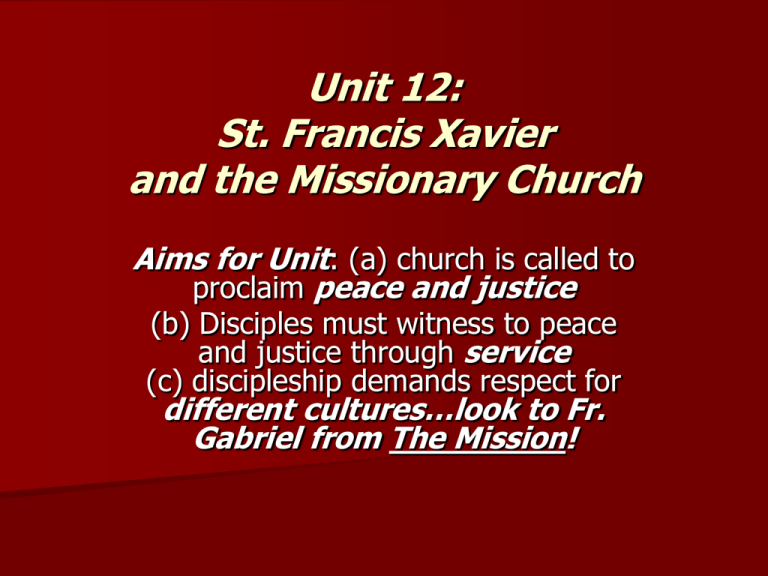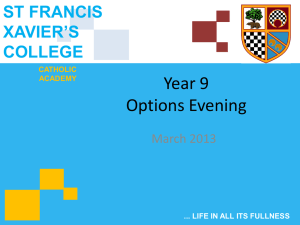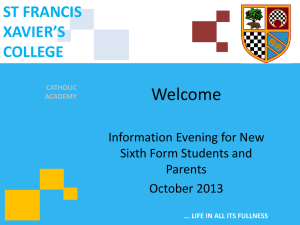Unit 11: St. Francis Xavier and the Missionary Church
advertisement

Unit 12: St. Francis Xavier and the Missionary Church Aims for Unit: (a) church is called to proclaim peace and justice (b) Disciples must witness to peace and justice through service (c) discipleship demands respect for different cultures…look to Fr. Gabriel from The Mission! Life of Francis Xavier Francis Xavier was born into an aristocratic Navarre family on the 7th of April, in the year 1506. Thus, he often was travelling on diplomatic missions to Castile or to France as the overseer of the castle. Life of Francis Xavier In the beginning of September 1525, Francis Xavier (age 19) goes to Pamplona to try the religious life…why? Francis Xavier = often the younger son from a noble family would take up the religious life in some form Xavier and a group of students go to the University of Paris… Francis Xavier and Ignatius In 1529 Xavier met Ignatius Loyola in Paris…. Ignatius = 16 years older than Francis! He had fought on the opposing side against Xavier's two older brothers…. Ignatius = old! Francis Xavier and Ignatius Ignatius made Xavier realize that the most important thing a person could do was to devote his life to God rather than look for professional success, fame, power or glory. Main Idea: "What does it profit a man if he shall gain the whole world, and lose his own soul?" (Matthew, 16: 26). What does this mean? (notebooks…) And so we have the Society of Jesus… The First Journey of Francis Xavier: India (1541-1545) Xavier’s first major journey: Goa served as the setting for Xavier's preaching. He also cared for the sick at the Hospital Real, where he also lived He cared both for prisoners and for patients suffering from leprosy. He taught them about the basic principles of the church and the sacraments From Goa, he was sent down to Ceylon, modern day Sri Lanka to work with the fishing communities. Style of teaching…gentle and inclusive = what does this mean? The Second Journey of Francis Xavier: Malacca, Indonesia (1545) Malacca (at that time) = Portuguese trading port, affluent and cosmopolitan, filled with sailing ships Xavier was in Malacca five times between September, 1545 and December, 1552. Malacca served as a kind of headquarters for Xavier while on his trips around the neighboring territories of the Moluccas It was also from Malacca that Xavier set off on his final great mission = to bring the Gospel to China. The Second Journey of Francis Xavier: the Moluccas, Indonesia (1546) The Moluccas were the main setting for Xavier's apostolic work…what is our definition of this?? Tradition relates that on his visit to the island of Seram, a land populated by headhunters, he lost his crucifix during a storm off the coast. Finally landing on the beach, a crab is said to have come out of the water bearing the crucifix and returned it to him. The continued existence of Christianity in these islands up to the present because of Xavier! Again, what was Xavier’s style of preaching to others? Inclusion!! The Third Journey of Francis Xavier: Japan (1549-1551) A Portuguese ship, caught in a typhoon, had accidentally discovered the land of Japan. The Portuguese sailors saved the life of a Japanese man called Yahiro Yahiro = very intelligent and open to new experiences…He heard about a great European priest who was to be found in Malacca and he wished to meet him. This meeting (in 1547) and the friendship which arose from it, was what awoke in Xavier a desire to travel to Japan. Xavier returned to Goa, then set off to Japan on the 15th of April, 1549. Francis Xavier’s Apostolic Work in Japan (1549- 1551) Remember, what was our definition of Apostolic Service? In the middle of the 16th century, Japan had little or no contact with other countries, except China and even this was of a limited nature. (Why is this fact important?) On15th of August, 1549 Xavier and his companions reached Kagoshima, the most southerly port of the island of Kyushu, one of the four large islands which formed the archipelago of Japan. Francis Xavier’s Apostolic Work in Japan (1549- 1551) Xavier faced a new challenge in Japan… The Japanese were of a higher moral and intellectual standard than any other he had met up to then: "The Japanese have the highest moral sense of any infidels that I have ever seen and they are so desirous of knowledge that they never leave off from asking questions and discussing all that we tell them..." – F. Xavier Xavier had begun by preaching in the streets… But through the personal approach of talks and arguments in the houses of the people, he began to appreciate the depth of the Japanese soul The tower of the Church of St. Francis Xavier behind Buddhist temples Francis Xavier’s Apostolic Work in Japan (1549- 1551) After one year he had converted 150 souls in Kagoshima, including the family of Yahiro After months of intense apostolic work he managed to convert about a thousand people, who went on to form a fervent Christian community in Yamaguchi (located in the heart of Japan)…. The modern church of St. Francis Xavier in Yamaguchi The Fourth Journey of Francis Xavier: China (1551) November, 1551 = Francis Xavier leaves Japan and takes ship to return to India. On the way, the ship stops off for a few days in the small Chinese island of Sancian. On reaching Malacca, he finds numerous letters awaiting him, including one from Ignatius Loyola which informs him that he has been named as Provincial of the Company of Jesus in the Far East. The Fourth Journey of Francis Xavier: China (1551-1552) February, 1552 = he arrives in Goa where he is given an enthusiastic welcome because he had been feared lost or dead in Japan… The idea of preaching in China could be the first step that could lead to the conversion of Japan…why? The Japanese had a lot of respect for China and as Xavier himself said in one of his letters: "...I hope to go to China to do our Lord's work which can be done as well as in Japan because, when the Japanese know that God's word has been received by the Chinese, they will undoubtedly lose the respect that they have for their sects…" And so he decided to organize a trip to China… The Fourth Journey of Francis Xavier: China (1551-1552) However, he needed the status of an official diplomatic mission. This meant it would be almost impossible to land in China. From the port of Singapore, the vessel sailed directly to China and they reached the small island of Sancian, just off the Chinese coast, in September. The saint spent three months on the island, without being able to leave it. The Chinese merchants refused to take him = all foreigners were prohibited from entering China. Finally, Xavier got in contact with a merchant from Canton who, bribed with 200 coins, agreed to carry him to his city. The beach at Sancian, where Xavier died on 3rd of December, 1552 The Fourth Journey of Francis Xavier: China (1551-1552) While waiting for the ship to China, Xavier caught Finally, Francis Xavier died in a makeshift hut on the beach of Sancian with only the company of his faithful Chinese friend, Antonio. It was the early morning of the 3rd of December, 1552 (he was 46..) pneumonia/high fever Xavier’s Funeral Rites…(1552) The day after his death Xavier was buried on the island of Sancian… Two months later, in order to take the body back to India, the coffin was unearthed and his corpse was found to be uncorrupted. The body reached Malacca on the 22nd March, 1553, but In June 1553, Ignatius wrote to Xavier requesting him to return to Europe. Not until 1554 did the news reach Europe that Xavier had died… The tomb inside the church of Sancian Xavier’s Funeral Rites…(1552-1553) Goa, India = reclaimed the body of the saint and in December,1553 the coffin was taken to India on the vessel of a devoted follower. Eventually taken to the Church of Basilica of Bom Jesus or Basilica of Good Jesus (still there today…)







